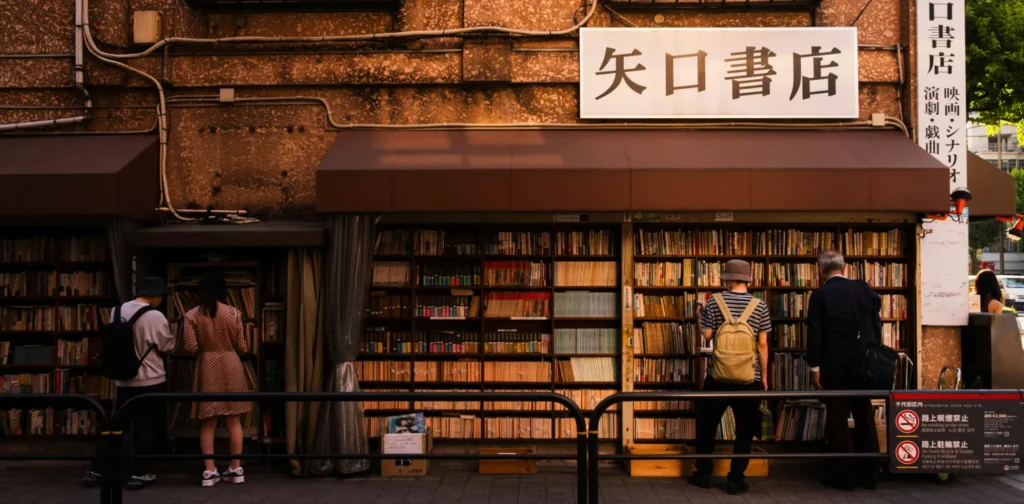Reviving Physical Bookstores in Japan Amidst Digitalization

Photo: Fumiaki Hayashi on Unsplash.
With the wave of technological development and digitalization, it is almost too easy to abandon anything physical, including books. In Japan, this has resulted in a dwindling number of physical bookstores, followed by various efforts to keep them alive.
Japan’s Physical Bookstores Decline
Beyond just a place to sell books, physical bookstores are also a hub of culture and communities. They can give hope in times of despair; they can also bring communities together in times of crisis.
In Japan, the number of physical bookstores has been decreasing rather significantly. As reported by the Japan Publishing Industry Foundation for Culture, 27.7% of Japan’s towns and cities do not have bookstores as of March 2024. Government data shows that low profit margins and tight competition with online stores are major reasons for this decline.
As digital technology becomes mainstream, many people start to migrate to and purchase digital books due to their practicality. Thousands of copies of books are left unsold to collect dust on bookstore shelves. As a result, bookstores have to pay transportation costs for returning unsold books and magazines, which they deduct from their already low earnings. Moreover, discount points from digital bookstores make them more attractive to buyers, leaving physical bookstores further behind.
Government and Community Initiatives
As a response, Japan’s Ministry of Economy, Trade, and Industry decided to form a cross-departmental project team to promote physical bookstores across the country. This project will invite bookstore managers to share their opinions about the conditions on the ground. Additionally, the government will introduce various ways to increase customer numbers and other support measures.
“The central and local governments and related industries should understand these problems and do what they can (to revive bookstores),” said Yoji Muto, the Minister of Industry, as reported by Japan Times.
Meanwhile, bookstore owners have been taking action in their own ways. In Kanda Jimbocho district, Tokyo, a shelf-sharing bookstore was established as a way to bring back the joy of physically browsing books for the communities. From individuals to companies, anyone can rent a shelf for 4,850-9,350 yen ($32-$61) per month and place any kind of books for sale. This way, people can have a variety of book options, not only just the popular ones sold at regular bookstores.
“Customers and shelf-owners visit the bookstore not only to sell and buy books, but to enjoy chatting about books,” said Rokurou Yui, one of the shelf-sharing bookstores, as cited in RFI.
The Importance of Real-life Engagement
Communities are the heart of our society, and physical spaces are important facilitators of community building. The presence of brick-and-mortar bookstores highlights the importance of real-life engagement with the people around us, as well as the accessibility of educational and cultural spaces for people to learn, socialize, and grow.
Editor: Nazalea Kusuma

Co-create positive impact for people and the planet.
Amidst today’s increasingly complex global challenges, equipping yourself, team, and communities with interdisciplinary and cross-sectoral insights on sustainability-related issues and sustainable development is no longer optional — it is a strategic necessity to stay ahead and stay relevant.

Kresentia Madina
Madina is the Assistant Manager of Stakeholder Engagement at Green Network Asia. She holds a bachelor’s degree in English Studies from Universitas Indonesia. As part of the GNA In-House Team, she supports the organization's multi-stakeholder engagement across international organizations, governments, businesses, civil society, and grassroots communities through digital publications, events, capacity building, and research.


 Addressing the Harsh Reality of Temporary Labor Migration Programs
Addressing the Harsh Reality of Temporary Labor Migration Programs  Mapping Conservation Needs for Sharks and Rays Globally
Mapping Conservation Needs for Sharks and Rays Globally  Hamdan bin Zayed Initiative: Abu Dhabi’s Path to Achieve the World’s Richest Seas
Hamdan bin Zayed Initiative: Abu Dhabi’s Path to Achieve the World’s Richest Seas  How Human Behaviour Becomes the Real Engine of Sustainability Action
How Human Behaviour Becomes the Real Engine of Sustainability Action  Germany to Improve Protection Measures for Critical Infrastructures
Germany to Improve Protection Measures for Critical Infrastructures  Data Center Boom: Looking at India and Beyond
Data Center Boom: Looking at India and Beyond